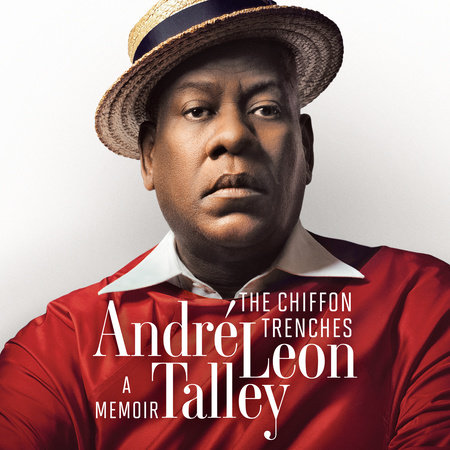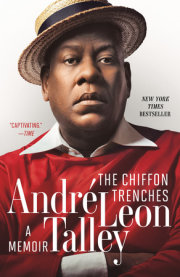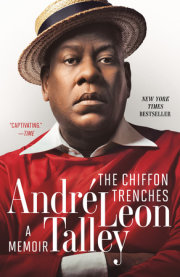I was born in a now-torn-down hospital on the edge of tony, affluent Georgetown in Washington, D.C. Two months after my arrival, my parents, Alma and William Carroll Talley, took me to my grandmother’s house in Durham, North Carolina, the center of the tobacco industry. My parents were young, and as was typical in Southern black households, it was decided I would live with my grandmother, Bennie Frances Davis, as my parents sought careers in the nation’s capital. I called my grandmother Mama.
Mama and I lived with my great-grandmother China. Both widows, they coupled pension checks and my grandmother’s salary from being a domestic maid at the men’s campus of Duke University, as well as supplemental income from my parents, to make a house that operated on organization, faith, God, and maintenance. As a young child I was given duties: dusting, collecting coal for the stoves, and gathering kindling from the woodshed, as well as washing dishes after meals.
There was churchgoing, and there was churchgoing: Sunday school; vacation Bible school; homecoming celebrations; baptisms in the rain-filled concrete pool constructed just beyond the churchyard cemetery.
I went to Lyon Park elementary school, which was just down the street from our home. I had close family bonds and my favorite cousins were my best friends. Most of the time, I managed to avoid the cruel bullies at school and in the neighborhood. I do, however, remember vividly staying home from school on a rare snow day and proudly building a three-tiered snowman in our front yard, complete with coal eyes, a carrot nose, and coal lips. I went into the kitchen at lunchtime, where my great-grandmother China was heating up a can of Campbell’s chicken noodle soup for me. By the time I put on my coat and returned outside, the neighborhood kids had destroyed my freshly constructed snowman. I turned around, went back inside, and sulked. What could I do? My grandmother’s mother couldn’t come out and take up my defense, and I had no desire to chase down and confront the vandals.
Young people can be very mean. When I would get upset, my uncle Lewis used to say to me, “Just keep on getting up. Get up every day and just keep going.” It was some of the best advice I’ve ever been given.
At an early age, I found my fantasy world in books and records, classical music, Nina Simone, Laura Nyro, Aretha Franklin, Diana Ross. In my aunt Myra’s country house, I found a book on the disaster of the Titanic, the luxury ocean liner that was never supposed to sink. The wealthy and the middle-class went to their deaths in the cold seas. Every time I went to visit Aunt Myra, I picked up this book; it resonated as something in my mind’s eye that was outside the norm of my everyday existence.
My favorite retreat was the city library in downtown Durham, North Carolina. By the age of twelve, I had read every magazine and book I had come across. My world became the glossy pages of
Vogue, where I could read about Truman Capote’s legendary ball, given at the Plaza, in honor of Katharine Graham. And Gloria Vanderbilt, in her patchwork antique quilts with Elizabethan ruffs, created by Adolfo. I loved seeing her photographed in her simple Mainbocher suits or the exotic Fortuny pleated gowns she kept folded in special coils, like snakes, to keep the silk vibrant. I dreamed of meeting Naomi Sims and Pat Cleveland, and living a life like the ones I saw in the pages of
Vogue, where bad things never happened. Blue spring skies lent my grandmother’s rosebushes a glorious color in our front yard. Summers were spent picking wild blackberries, watching cardinals zoom around our house, and having wonderful, delicious dinners, cooked all day and eaten at five-thirty. Food was our luxury—simple, good, home-cooked food. Every day, there were fresh-cooked homemade meals. Sometimes we ate leftovers, but I remember Sundays, when hot, fresh beaten buttermilk biscuits; rows of crisp bacon; scrambled eggs; and preserves made our breakfast. Cake, pie, and a myriad of home-cooked desserts were my favorites.
Autumn brought with it crisp, crinkly golden leaves from the maple tree, a massive one in our front yard, its leaves awful to rake. In the winter, if it snowed, I had to gather extra buckets of glossy chunks of coal in the scuttle and store them on the back porch.
Great-Grandmother China died in January 1961, and I felt alone for the first time. For a budding young man, this was overwhelming, the death scene of my great-grandmother, a lady who was the matriarch of a God-fearing and God-loving family.
The family gathered at Aunt Pete’s, and she made enough food to feed everyone, including her seven daughters, one surviving son, and assorted extended family members. Throughout the night, into the morning, the adults were in the family room, sharing stories of growing up and of their beloved mama.
Somehow, there was an economy of words between my grandmother and me as we shared this humble, modest household, filled with nurturing love and the greatest values: treating others with kindness, and caring for your neighbors and family.
Life went on. My parents divorced when I was nine. Nobody told me about their separation, but I eventually figured it out. Both of them continued to visit frequently, my father always bringing me some luxurious gift: a bright red brand-new bicycle, the World Book encyclopedia, a black and white television, or my first record player. I had an allowance and would go to downtown Durham on Fridays with Mama and purchase the latest 45 rpm records. I treasured each of the items he gave me.
My mother had left my father because she thought she could do better and had planned to marry another man who was slightly more affluent than my father. One morning, not long after the divorce, she got an invitation to that man’s wedding, to another, younger, woman. That broke my mother’s spirit, forever. She became ill after that. Her hair turned white, prematurely, and she had a sort of meltdown that resulted in her trying to set her apartment on fire. And on top of it all, she refused even the smallest amount of alimony she was entitled to by law. She simply handed him the way out of their marriage and soldiered on financially but became cruel and bitter emotionally. She would come visit us in Durham, and she would go to church and be part of everything, but there was never much of a conversation to be had between the two of us. I would talk to her, but she barely said anything back. While I knew she loved me, I don’t think she liked me.
Like most Americans, my grandmother and I watched the presidential inauguration of John F. Kennedy, as it was a defining moment in a new era for our country. It symbolized hope and it also symbolized glamour. Jackie Kennedy was the youngest First Lady and she was an influencer—perhaps the first influencer of the modern world. I was in awe of her, the way she walked at the inauguration, in her cloth coat. I was obsessed with her pillbox hat, and her little snippet of fur at the collar, and her fur-edged boots, as well as the muff she carried to keep her hands warm during the freezing-cold January day.
My captivation continued when on Valentine’s Day, in 1962, A Tour of the White House with Mrs. John F. Kennedy aired in black and white on all the networks. I was so caught up with the sheer magnitude of this glance inside the First Home of our nation. Jackie Bouvier Kennedy, and her style, truly resonated with me. I knew I had witnessed a moment, one that was sure to be the beginning of many.
There she stood, hair perfectly coiffed and curled, in her Chez Ninon line-for-line copy of an original Dior from Paris. She spoke of the White House with knowledge and eloquence. It was then I learned the word “Porthault”; the Parisian linen firm had donated a long white tablecloth for the State Dining Room, hand-embroidered in gold thread. I learned that she wanted simple glasses for water and wine. She revealed she had found them in Virginia. She spoke of the Stanford White moldings, painted white, from 1902. And she recalled that Teddy Roosevelt had commissioned a fireplace surrounded in marble, with images of American buffaloes.
From her quiet, elegant manner of speaking, her control of her message, her focus on the history of this great edifice, I learned my passion and love for antiques and the finer things. So in life, I followed Jackie Kennedy. She was my heroine in all things that mattered: clothes, decorating, and the way she presented herself as First Lady. My aunts copied her style, according to their budget, with pillbox hats and elegant chain-strap handbags. Gloves, of course. All respectful Negro church ladies were inspired by Jackie Kennedy (“Negro” was the proper term then; “African American” is proper today).
My grandmother had a drawer full of gloves, her most luxurious accessory, for every season of the year. Another drawer held cherished handkerchiefs, which she slipped into her Sunday handbag. Mama wore medium-heeled shoes, which fascinated me to watch on our walk to church, especially her navy blue leather ones, with the grosgrain bow, by Naturalizer, bought at great expense, and with a matching handbag.
The orchestrated funeral of President John F. Kennedy was the most incredible pageantry of dignity. There was Mrs. Kennedy, in her black Givenchy suit, with the tassel fringe as buttons, her face covered by a veil attached to her pillbox. It was a message to the world that she was a mother and a wife, and created a symbol of strength and style. Jackie Kennedy seemed more like a film star than the wife of the president. She had more impact on me than any actress.
Copyright © 2020 by André Leon Talley. All rights reserved. No part of this excerpt may be reproduced or reprinted without permission in writing from the publisher.






